WASHINGTON – Federal officials Tuesday approved an updated COVID-19 vaccine for use by anyone age 6 months or older, and health officials are urging people to get the shot amid a fall surge in cases.
The Arizona Department of Health Services reported 2,476 new cases of COVID-19 in the week ending Sept. 6, down from preceding weeks but still almost twice the number of infections as were reported in early July.
While they caution that it is too early to call it a pattern with coronavirus, health officials say viral infections, like the flu, typically rise in the fall. Which is all the more reason to take advantage of the new vaccines, they said.
“This fall we’re going to be encouraging people to certainly get their flu shot,” said Dr. Georges Benjamin, the executive director for American Public Health Association. “Once we are told by the CDC who they recommend to get the COVID shot, we will be encouraging that as well.”
That recommendation from the Centers for Disease Control and Prevention came Tuesday, when the CDC’s Advisory Committee on Immunization Practices cleared use of the updated Moderna and Pfizer-BioNTech vaccines.
Besides making the vaccine available, the committee’s approval also means that vaccinations will be covered by most private health insurance, Medicare and Medicaid. That should cover about 90% of Americans, said experts during a webinar Tuesday on the cost of vaccinations.
“All ACIP-recommended vaccines are required to be available at no cost to the recipient, the consumer, the patient” through private insurance plans, said Patricia D’Antonio, co-chair of the Adult Vaccine Access Coalition. “For Medicare, the same applies, and on Oct. 1 on Medicaid … the COVID vaccine is covered at no cost.”
“We need to make sure that the coverage is out there so that someone is able to have the vaccine … to help prevent and reduce the impact of COVID” if they want to get vaccinated, she said.
Speakers at the webinar said that for the 10% who are not covered by Medicaid or private insurance, the Department of Health and Human Services’ Bridge Access Program should fill the gap. That $1.1 billion program was introduced in April as the federal government was phasing out its massive vaccination effort and shifting that job to private providers.
“The Bridge Access Program is specifically designed to provide access to vaccines for people who didn’t have eligibility under other mechanisms,” said Dr. Mario Ramirez, an emergency physician at HHS’ Office of Global Affairs and Office of Pandemic and Emerging Threats.
Ramirez, speaking during the webinar, said the program benefits people who “didn’t have Medicare coverage, Medicaid, private insurance or they fell under or below other social economic lines that prevented access to vaccines.”
The program is only available to those 18 and older, and will only be around through December 2024. For those under age 18, a program called Vaccines for Children can provide free vaccinations if the child meets income and other requirements.
The CDC said the latest vaccines, protect against the newest variant of the coronavirus, should be available later this week.
While the government is not as heavily involved in vaccine distribution as it was at the height of the pandemic, some experts say that may be a good thing. People who were hesitant to take part in a government-backed effort might be more inclined to get the vaccine from their doctor or local pharmacy.
“Honestly, I am glad it’s being treated like a normal vaccine now,” said Will Humble, the executive director of the Arizona Public Health Association. “Maybe when it’s treated like any other vaccine, people who were skeptical about it might finally decide okay I’m going to go ahead and do it just like my flu shot.”


